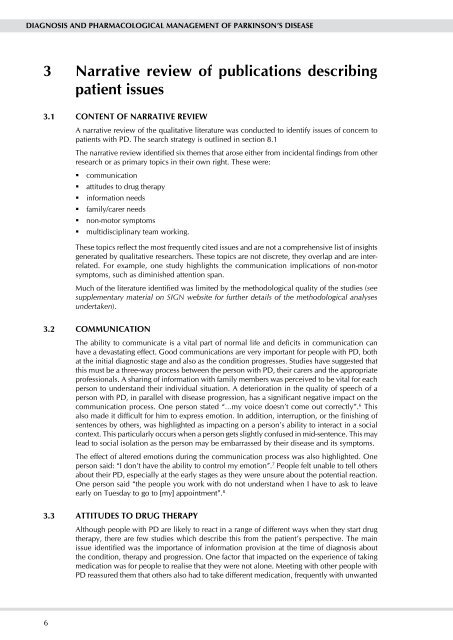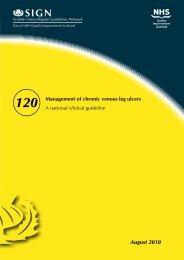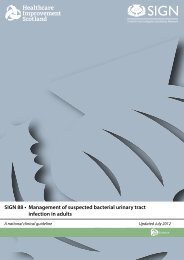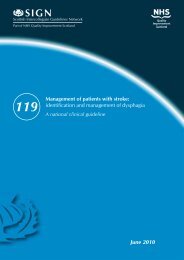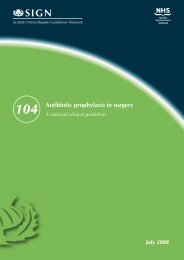Diagnosis and pharmacological management of Parkinson's - SIGN
Diagnosis and pharmacological management of Parkinson's - SIGN
Diagnosis and pharmacological management of Parkinson's - SIGN
Create successful ePaper yourself
Turn your PDF publications into a flip-book with our unique Google optimized e-Paper software.
<strong>Diagnosis</strong> anD Pharmacological <strong>management</strong> <strong>of</strong> Parkinson’s Disease<br />
3 narrative review <strong>of</strong> publications describing<br />
patient issues<br />
3.1 content <strong>of</strong> narratiVe reView<br />
6<br />
A narrative review <strong>of</strong> the qualitative literature was conducted to identify issues <strong>of</strong> concern to<br />
patients with PD. The search strategy is outlined in section 8.1<br />
The narrative review identified six themes that arose either from incidental findings from other<br />
research or as primary topics in their own right. These were:<br />
communication<br />
attitudes to drug therapy<br />
information needs<br />
family/carer needs<br />
non-motor symptoms<br />
multidisciplinary team working.<br />
These topics reflect the most frequently cited issues <strong>and</strong> are not a comprehensive list <strong>of</strong> insights<br />
generated by qualitative researchers. These topics are not discrete, they overlap <strong>and</strong> are interrelated.<br />
for example, one study highlights the communication implications <strong>of</strong> non-motor<br />
symptoms, such as diminished attention span.<br />
Much <strong>of</strong> the literature identified was limited by the methodological quality <strong>of</strong> the studies (see<br />
supplementary material on <strong>SIGN</strong> website for further details <strong>of</strong> the methodological analyses<br />
undertaken).<br />
3.2 communication<br />
The ability to communicate is a vital part <strong>of</strong> normal life <strong>and</strong> deficits in communication can<br />
have a devastating effect. Good communications are very important for people with PD, both<br />
at the initial diagnostic stage <strong>and</strong> also as the condition progresses. Studies have suggested that<br />
this must be a three-way process between the person with PD, their carers <strong>and</strong> the appropriate<br />
pr<strong>of</strong>essionals. A sharing <strong>of</strong> information with family members was perceived to be vital for each<br />
person to underst<strong>and</strong> their individual situation. A deterioration in the quality <strong>of</strong> speech <strong>of</strong> a<br />
person with PD, in parallel with disease progression, has a significant negative impact on the<br />
communication process. One person stated “…my voice doesn’t come out correctly”. 6 This<br />
also made it difficult for him to express emotion. In addition, interruption, or the finishing <strong>of</strong><br />
sentences by others, was highlighted as impacting on a person’s ability to interact in a social<br />
context. This particularly occurs when a person gets slightly confused in mid-sentence. This may<br />
lead to social isolation as the person may be embarrassed by their disease <strong>and</strong> its symptoms.<br />
The effect <strong>of</strong> altered emotions during the communication process was also highlighted. One<br />
person said: “I don’t have the ability to control my emotion”. 7 People felt unable to tell others<br />
about their PD, especially at the early stages as they were unsure about the potential reaction.<br />
One person said “the people you work with do not underst<strong>and</strong> when I have to ask to leave<br />
early on Tuesday to go to [my] appointment”. 8<br />
3.3 attituDes to Drug theraPY<br />
Although people with PD are likely to react in a range <strong>of</strong> different ways when they start drug<br />
therapy, there are few studies which describe this from the patient’s perspective. The main<br />
issue identified was the importance <strong>of</strong> information provision at the time <strong>of</strong> diagnosis about<br />
the condition, therapy <strong>and</strong> progression. One factor that impacted on the experience <strong>of</strong> taking<br />
medication was for people to realise that they were not alone. Meeting with other people with<br />
PD reassured them that others also had to take different medication, frequently with unwanted


